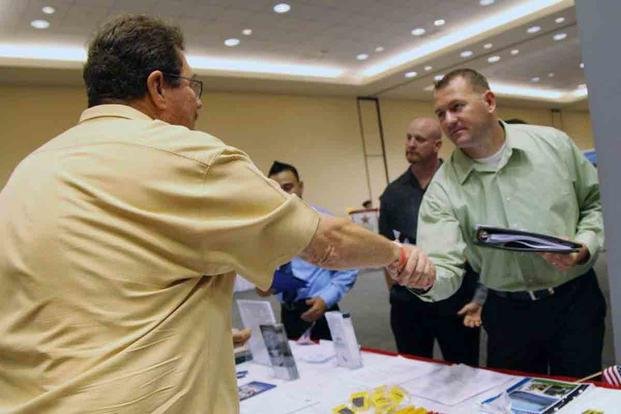National Hire a Veteran Day aims to raise awareness about the challenges that military veterans face when transitioning to civilian employment and to encourage employers to hire veterans, recognizing the valuable skills and experiences that veterans bring to the workforce.
Despite what you might think, National Hire a Veteran Day is not a federal holiday, no law demands that employers hire veterans. The day's purpose is to remind employers that America's separating vets are ready, able and willing to work.
It was designed to inspire U.S. businesses to hire some of the estimated 200,000 veterans who leave the armed forces every year. Hiring a veteran means employers not only get a dedicated, capable employee, but they're also eligible for some sweet tax credits, at least through 2025.
Tax credits aside, here are seven reasons to think about hiring veterans on this July 25, National Hire a Veteran Day.
1. Veterans Have More Than Technical Skills
These days, traits such as leadership, teamwork and self-actualization are known as "soft skills" among employers and hiring managers. Hiring a young veteran means you're getting not only someone who can do their job but who also has many of the "soft skills" that come with work experience. Other skills include project planning and organization, critical thinking and managing others.
In a 2024 report by the Society for Human Resources Management, most HR professionals said in a survey that veterans outperform civilian employees in areas such as work ethic, teamwork and leadership. And according to a 2017 Rand Corp. report, veterans who are roughly the same age as new college graduates are better at working with other employees, at leading in the absence of orders from authority, and at professional customer service (along with dozens of other skills).
2. They Have On-the-Job Experience and Training
All things being equal, hiring a veteran over a new college grad for a position in which both are equally qualified means you'll get someone with real-world work experience. While most veterans should expect to start over when entering the civilian workforce for the first time, many veterans immediately assume official or unofficial leadership roles due to their years of working.
Employers often can count on a diverse set of experience from their veteran employees. Many vets were expected to work in all kinds of environments with many different tools, so they are comfortable adapting to new situations.
3. Not All Veterans Work in Combat Career Fields
This isn't a surprise to military members, but civilian employers may see a veteran's military career through the lens of American film and television. Only 14% of the U.S. military's hundreds of career fields are combat specialties. The other career fields have direct civilian counterparts, especially in terms of construction, engineering and medicine.
Mission support careers are as diverse in the active military as they are in civilian life. Military members receive the same (or better) education, on-the-job training and certifications as any other person working in their respective fields. The military even trains photographers, chefs and human resources specialists, just to name a few.
4. The U.S. Military Thrives on Diversity
Any business looking to diversify its workforce should consider adding military veterans to its force. According to the Defense Department's own statistics, racial and ethnic minorities make up 40% of the military's active-duty component, which is "slightly" more diverse than the general American population.
So if a business is looking for those who thrive harmoniously with a diverse set of co-workers, U.S. veterans are not only accustomed to diversity; they thrive in it.
5. Veterans Are More Likely to Have a College Degree
Former military officers all have at least a four-year degree, and prior-service enlisted veterans get access to some of the greatest education benefits available in the United States today. Not only are those benefits available both before and after their service, vets take advantage of them.
The Post-9/11 GI Bill offers military members unparalleled educational opportunities, and the result is an era of veterans who are more educated than any that came before. In many veteran demographics, the number of vets with a four-year or advanced degree outpaces their civilian counterparts, according to the Bureau of Labor Statistics.
6. Vets Don't Need a Rank Structure
Employers may harbor a preconceived notion that former military members are good only at taking orders and require a strict hierarchy to perform well in their chosen career, company or industry. While it's true that veterans come from a rigid rank structure, most are also trained to think and act quickly to respond to fluid situations. Many have seen events that required a degree of autonomy when that rank structure wasn't available.
Many business owners relayed their views of their veteran employees to the Department of Labor when it was creating its Guide to Hiring Veterans. They found veterans to be creative problem solvers with integrity and a mission-oriented approach to their work. Veterans, they said, were agile, adaptive self-starters who perform well under pressure.
7. Veteran Employees Work Well in Groups
In the military, service members often rely on their core group to operate effectively and safely. The camaraderie that develops over years of teamwork builds not only the ability to work well with others, but also a desire to feel like they are part of a team. Veterans intuitively understand the value of teamwork in accomplishing set goals and take personal responsibility for the success of their group.
To top it all off, in the absence of designated or external leadership in their group, vets have no problem stepping into an official or unofficial leadership role. They can be counted on to apply the same mission-oriented approach they take in their individual tasks to team sessions.
Want to Know More About Veteran Jobs?
Be sure to get the latest news about post-military careers, as well as critical info about veteran jobs and all the benefits of service. Subscribe to Military.com and receive customized updates delivered straight to your inbox.







